Seeking Bipartisan Consensus on Infrastructure
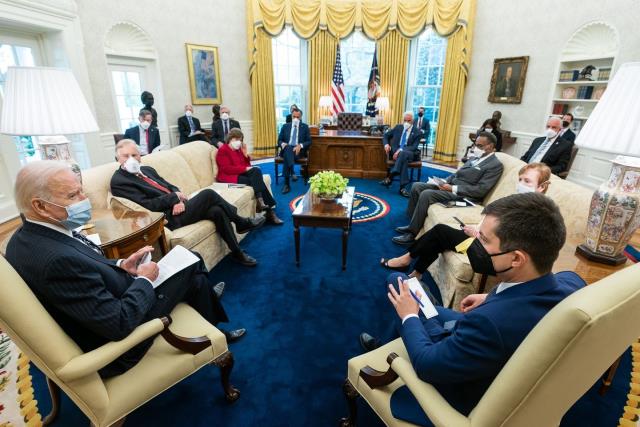
I’m the masked man next to the President at a meeting in the Oval Office on the infrastructure bill
Infrastructure has been a key topic this month, as Congress negotiates its priorities with the White House. Earlier this month, I met with President Biden and several lawmakers to discuss ongoing negotiations for the next big legislative package.
To my surprise, President Biden opened the meeting by announcing that I was going to manage the discussion, which involved a bipartisan group of five House members and five Senators, all former governors or mayors. There was general agreement that a major infrastructure program was overdue and that it should be paid for. The disagreements were what exactly should be in the package (although I was happy that broadband seemed to be on everybody’s list), and how exactly to pay for it.
Although we’re a long way from a deal, both sides seemed genuinely interested in trying to get there and everyone realized compromise would be necessary to make it happen. Getting to ask the questions took me back to my days on MaineWatch, but we never dreamed back in those days of getting to use the Oval Office as a set! The worst part for me was realizing after the press came in to take their pictures that my socks didn’t match. Oh well, at least Mary wasn’t there to see it, and besides, as my dad would say, I have another pair just like them at home!
Read my full statement on the infrastructure meeting HERE.
If you would like further information:
Cleaner Air for a Brighter Future
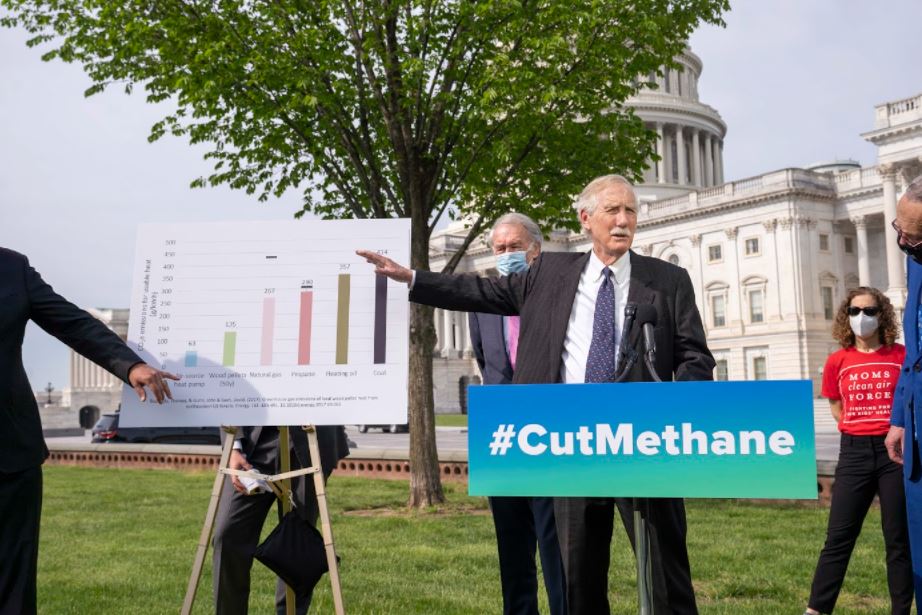
On April 29, 2021, the Senate voted 52 to 42 to pass a resolution of disapproval under the Congressional Review Act (CRA), rescinding last year’s Trump Administration rollback of critical methane regulations that weakened or completely eliminated requirements that oil and natural gas companies limit methane and volatile organic compound (VOC) emissions from their operations. It sounds a bit complicated – we repealed the repeal! – but in reality, it is one of the easiest, most effective steps we can take to address climate change immediately. In fact, these regulations are so commonsense, they have the support of both environmental groups and many leading oil and gas companies!
I joined Senators Martin Heinrich (D-N.M.) and Ed Markey (D-Mass.) in leading the resolution, which was supported by a bipartisan group of senators including Senator Susan Collins (R-Maine). Earlier that day, I spoke on the Senate Floor to urge my colleagues to vote to restore the regulations. You can watch my full floor speech HERE.
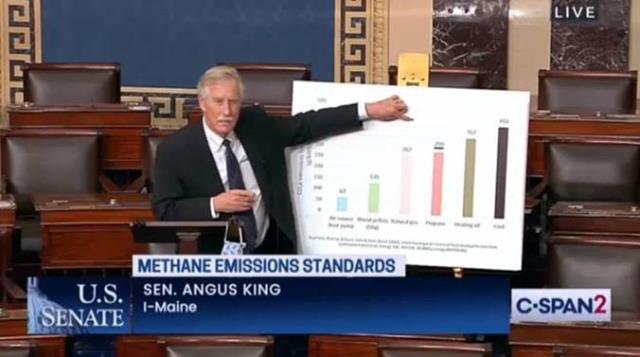
This vote is a victory for our climate, our public health, and our future. Methane is an incredibly harmful greenhouse gas, which traps more than 80 times as much atmospheric heat as carbon dioxide. In addition, the gas is tied to a number of serious health problems that affect vulnerable populations across the nation. The problem is serious – but fortunately, there is an easy, commonsense solution that has drawn support from both environmental groups and fossil fuel companies.
The action reinstates critical regulations on methane emissions, correcting last year’s dangerous misstep that put the short-term interests of polluters ahead of the long-term health of our environment. This is a monumental moment in the fight against climate change – but it must be the first step of many. In the weeks and months ahead, Congress must continue to advance bold policies that address the crisis of climate change and protect this planet for our children and grandchildren.
$56 Million Coming to Maine from American Rescue Plan to Support Small Business Community
For more than a year, Maine’s small businesses have faced down an endless stream of challenges that has forced them to constantly adjust, overhaul or flat-out push pause on their business models. That's why I'm pleased to announce that the U.S. Department of Treasury will allocate at least $56,234,176 to Maine businesses and entrepreneurs through the State Small Business Credit Initiative (SSBCI).

The SSBCI is designed to leverage additional funding sources for small businesses, and is expected to help provide at least $503 million in capital to support Maine small businesses and entrepreneurs as the state continues its recovery from the impacts of the coronavirus pandemic. The program was reauthorized and funded through the American Rescue Plan, which I voted in favor of in March.
Now, as vaccinations continue to roll out in Maine and across the country, it is vital that small businesses, entrepreneurs, and startups have access to the capital they need to lay the foundation for long-term success. The American Rescue Plan’s commitment to support small businesses through the SSBCI will help our local businesses get back on track, and I urge all of our state’s eligible small business owners to review the program’s upcoming rollout to determine if it can help their business grow and thrive in Maine.
For more information, please click HERE.
Legislative Update
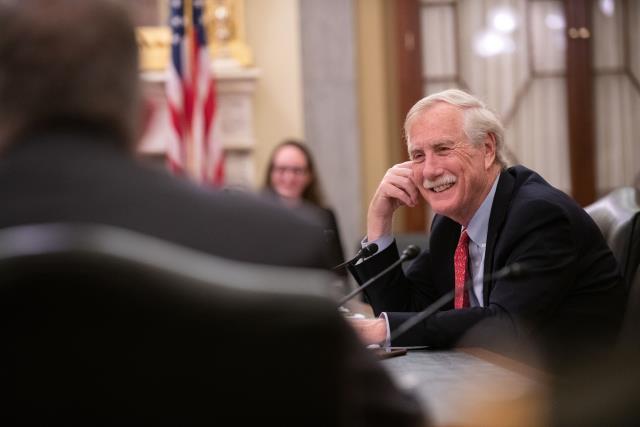
As a reminder, you can read more on my regularly updated press release page at king.senate.gov. Here are some other priorities I’ve been working on:
- Combatting anti-Asian hate crimes. I supported the Senate's passage of the COVID-19 Hate Crimes Act, which aims to confront the sharp increase of hate crimes aimed at Asian Americans and Pacific Islanders (AAPIs) during the coronavirus pandemic. I'm also a cosponsor of a Senate resolution that condemns all forms of anti-Asian sentiment, racism and discrimination. Read more HERE.
- Standing up for Maine dairy farmers. I cosponsored the Defending Against Imitations and Replacements of Yogurt, milk, and cheese to Promote Regular Intake of Dairy Everyday Act (DAIRY PRIDE Act), a bill that would combat the unfair practice of mislabeling non-dairy products using dairy names. Read more HERE.
- Expanding access to summer meals for Maine students. I cosponsored bipartisan legislation to expand summer meal programs across the country to ensure children maintain access to nutritious meals when school is out. The COVID-19 pandemic, and transition to remote learning, exacerbated the challenges that food insecure students face when schools are closed. Read more HERE.
- Supporting small businesses. I joined Senator Susan Collins (R-Maine) to introduce a bill that would provide additional support for those seasonal small businesses who were unable to utilize further relief provided by the December 2020 law because their PPP loans had already been forgiven. Read more HERE.
- Pushing to improve the quality of home care. I introduced three legislative proposals which specifically aim to address shortcomings in training for home health workers and open new pathways for career advancement. These efforts seek to stabilize the field, which has been stretched thin by the pandemic and already suffers high turnover rates due to unpredictable hours and low wages. Read more HERE.
A Radical Idea to Address the Deficit: Enforce Tax Laws
On April 27th, it was reported that President Joe Biden intends to propose an $80 billion increase in funding to the IRS over the next 10 years, because the nation is missing out on hundreds of billions of dollars owed. Below is an op-ed I wrote for TIME Magazine on April 14th, laying out the value of increased support for the IRS.
As I write this, the national debt sits above $28 trillion, and rises rapidly by the minute; each passing day increases the burden we leave for our children and grandchildren. It’s clear that action is needed, but bipartisan consensus has been hard to find. When politicians discuss the national debt, the conversation usually centers on raising taxes or cutting spending. Sounds easy, but deciding which taxes and what spending is the hard part, and while we’re debating, the debt keeps going up.
As a rare independent in Congress, I’m always trying to look for creative ways to bridge the partisan divide. That’s how I’ve discovered a truly novel idea to address this challenge: let’s enforce the laws that are already on the books!

It shouldn’t be controversial to say that every American should pay their taxes—but in recent years, Congress has not given the nation’s tax collector the tools it needs to enforce the law. Since 2010, Congress has reduced the Internal Revenue Service’s budget by roughly 20%, impeding the service’s ability to make sure every American pays what they owe.
These deep cuts have left the IRS understaffed and unable to fulfill its mission. In 2010, 1.1% of all returns were audited; in 2019, that number fell to 0.45%. And those cuts have had left the IRS underprepared to scrutinize high-income earners who are more likely to pursue protracted legal battles with the aid of high-priced lawyers. In order to adapt to its limited resources, the IRS shifted its audit priorities—squeezing a few extra hundred dollars here and there from low-income Americans rather than potentially millions from those in higher income brackets.
Investing to support this enforcement will not only pay for itself, but will make a serious dent in the deficit. According to a rigorous analysis from Harvard and Penn economists, a $100 billion investment in staffing and resources over the next 10 years would reap well over a trillion dollars in tax revenues from high earners or businesses who have been eluding payment; that’s literally putting in a dime and getting a dollar back.
I’ve seen the disparity in enforcement play out in my home state. Data collected by ProPublica highlighted that Maine’s Piscataquis and Washington Counties have a higher audit rate than the national average. The problem? These counties each have a median household income of roughly $40,000—tens of thousands of dollars below the nation’s median household income. These time-consuming, often confusing audits create challenges for low-income Americans who can’t afford to hire someone to help them navigate the process, and yield relatively little benefit in reclaimed tax revenues.

It simply doesn’t make sense. Imagine, for a moment, that you lend money to two friends—$10 to one, $10,000 to the other. When the day comes to collect, which friend will you focus your time and effort pursuing for repayment? If you answer the friends who owes $10,000, you’d be like most people. If you answer the friend you lent $10, you’d be like the U.S. government.
While low-income Americans have been increasingly targeted, the under-resourcing of the IRS has emboldened tax avoidance by some of our nation’s wealthiest citizens. A recent study estimates that the nation’s richest 1% fail to report more than 20% of their income to the government, triple the rate found in the nation’s lowest 50% of earners.
The problem is clear, but fortunately, so is the solution: we need to increase the IRS’s funding so it has the resources and staff needed to take down tax cheats. By restoring the IRS to its 2010 funding levels—or potentially providing additional funds beyond that—we will give the IRS the tools it needs to fulfill its mission and ensure that no one, no matter how wealthy, can out-muscle or out-lawyer the rest of us to avoid their tax liabilities.
The IRS may not be the most popular government entity, but its work is essential to both America’s current services and long-term fiscal health. When a few people cheat on their taxes, it means one of two things: either the rest of us have to make up the difference, or we add to the debt we’re leaving to our kids.
This isn’t complicated; if we give the IRS the resources it needs to enforce the law, the deficit shrinks and the system works more fairly for everyone. This won’t solve the problem entirely, but it would sure help us to stop the hole from getting deeper.
Top Experts Talk Nuclear Deterrence in Inaugural Hearing of the Strategic Forces Subcommittee
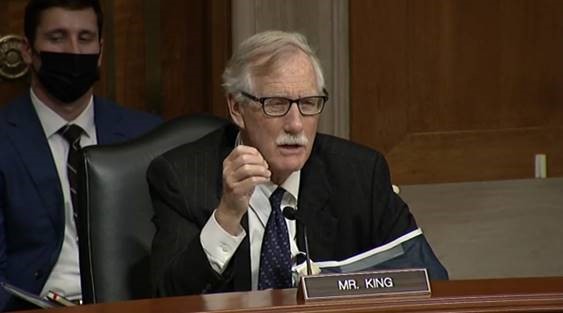
In the 117th Congress, I’m serving as the Chairman of the Strategic Forces Subcommittee, which oversees programs related to America’s nuclear and strategic forces.
Nuclear weapons are a deterrence strategy by nature – we have them but we pray to never use them – but several questions and concerns remain about how to properly manage relations with our adversaries and execute that strategy.
During the 117th Congress’s first open hearing of the Senate Armed Services Subcommittee on Strategic Forces – and my first hearing as Chairman of the Subcommittee – I convened top policy experts for an in-depth discussion on America’s preparedness and accountability of leadership for nuclear deterrence strategy. We underscored the importance of strengthening the chain of nuclear command and control so that the U.S. has the ability to respond to potentially catastrophic attacks in an effective manner, and questioned whether current policies in place are sufficient to prevent nuclear weapons falling into the wrong hands – such as terrorists and other non-state actors.
The hearing featured testimony from: Dr. Brad Roberts, Director Center for Global Security Research, Lawrence Livermore National Laboratory; Dr. Paul Bracken, Professor of Management and Professor of Political Science, Yale School of Management; USAF General Claude Kehler, Former Commander, United States Strategic Command; and Franklin Miller, Principal of the Scowcroft Group.
Learn more HERE.
Cyberdeterrence Highlighted on NPR's On Point

Earlier this month, I joined WBUR host Kimberly Atkins, Nicole Perlroth, and Dmitri Alperovitch on NPR's On Point to discuss the Cyberspace Solarium Commission’s work to improve America’s cyberdefenses, and next steps to keep our networks safe.
The reality is, we have raced into the digital age without realizing what the cybervulnerabilities are. Our financial system, electric grid, and telecommunications network could go dark overnight – the dangers of a cyberattack cannot be overestimated and must be addressed through a comprehensive national cyberstrategy.
The Glamorous Life of a U.S. Senator...

(via @anguskingmaine on Instagram)
Zoooom! Like many of you, each day I have dozens of Zoom calls, ranging from great visits with high school students, to national security discussions, to meetings with small business owners, among others.
First, in Mary’s shot above, notice the high-tech camera stand which consists of a footstool carefully balanced on a kitchen stool with a pile of books—a couple of cookbooks, a dictionary, and a medical manual—on top.
Then of course, is the half-uniform—coat and tie on top and jeans and sneakers on the bottom. (And yes, that’s a dog bed by my left foot). What struck me at the end of the day was how many people I was able to talk to in so many different places in such a short time. All those meetings in person, involving travel time for me and the others, would have probably taken a week and some might not have been logistically possible at all. There’s no question that face-to-face is better, but there is something to be said for the economy and efficiency of a day like this one. And besides, I like going to work in jeans!
Connecting with Maine People through the Pandemic
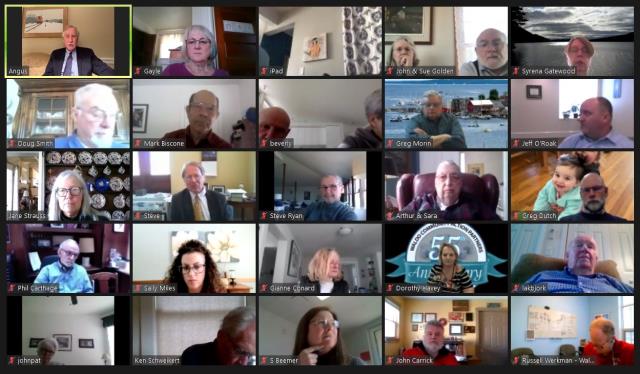
Members of the Belfast Rotary Club
Even as the pandemic changes the way we interact, I've made it a priority to engage with Maine people from all walks of life and helpful organizations to address questions surrounding the coronavirus pandemic and identify remaining work to be done. Last May, I held a tele-town hall, inviting all Maine people to call in toll-free, to listen and respond to questions about coronavirus response efforts. Since the Senate passed the CARES Act, I've participated in teleconferences and phone calls with:
- Maine healthcare providers and advocates, such as the Maine Dental Association and Protect our Care.
- Maine students and educators, including the 16 Maine 2020 County Teachers of the Year, Maine Jump$tart Coalition’s two Finance Educators of the Year, school psychologists, MLTI Virtual Student Conference, University of Maine System Student Veterans, and civics and history teachers from schools across Maine.
- Maine business and community leaders, including members of the Maine State Chamber of Commerce, Maine Coast Fishermen’s Association, Penobscot Bay Regional Chamber of Commerce, the New England Council, 120 of Portland’s small business owners and 500 Maine employees of Sun Life.
- Maine nonprofits including the Maine Association of Nonprofits (MANP), United Way and YMCA Youth Advocates from Maine.
- Maine seniors in a call hosted by AARP Maine.
- Maine democracy-focused organizations, such as the Maine League of Women Voters.
In the News
Thanks for subscribing to my monthly newsletter! I would love to hear your ideas for how we can make Maine and our country a better place. Please feel free to reach out with any questions, comments, or concerns by visiting: https://www.king.senate.gov/contact —we look forward to hearing from you.
***PLEASE NOTE***
Due to the impacts of COVID-19, my staff in Washington, D.C. are working remotely – but we’re still at work, ready to help you navigate any challenges you’re facing during this challenging time.
All the best, and stay healthy!

To unsubscribe to this e-Newsletter click HERE.
|